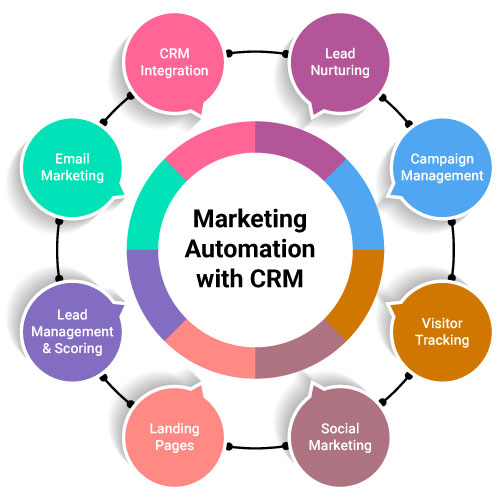Marketing automation integration is a critical feature of Customer Relationship Management (CRM) systems, enabling businesses to streamline marketing efforts, nurture leads, and boost revenue. By leveraging data to deliver personalized campaigns, this integration aligns sales and marketing teams, enhances customer engagement, and optimizes the sales funnel. This article explores the key features, benefits, and strategies for effectively integrating marketing automation with a CRM platform.
What is Marketing Automation Integration?
Marketing automation integration connects marketing automation software with a CRM system to create a unified platform for managing customer interactions and campaigns. This integration allows businesses to automate repetitive marketing tasks, target high-potential customers, and synchronize data between sales and marketing teams. By streamlining processes and leveraging data-driven insights, it enhances campaign effectiveness and drives business growth.
Key Features of Marketing Automation Integration
Integrating marketing automation with a CRM offers a range of powerful features:
- Lead Scoring: Assigns scores to leads based on their engagement (e.g., website visits, email opens), prioritizing those most likely to convert.
- Personalized Campaigns: Delivers tailored content to customers based on their interactions, preferences, and behaviors.
- Lead Nurturing: Automates follow-up emails and content delivery to guide leads through the marketing funnel.
- Data Synchronization: Seamlessly transfers lead and customer data between marketing and sales teams, ensuring alignment.
- Automated Email Workflows: Sends targeted emails at optimal times based on customer actions or sales process stages.
- Campaign Tracking: Provides insights into campaign performance, such as open rates, click-through rates, and conversions.
- Centralized Data: Consolidates customer data in the CRM, enabling personalized and consistent communication.
These features ensure marketing efforts are efficient, targeted, and aligned with sales objectives.
Benefits of Marketing Automation
Integrating marketing automation with a CRM delivers significant advantages:
- Improved Efficiency: Automates repetitive tasks like email list management and campaign execution, saving time and resources.
- Enhanced Customer Engagement: Delivers personalized content, improving customer experience and increasing conversion rates.
- Better Lead Management: Identifies and nurtures high-quality leads, moving them efficiently through the sales funnel.
- Stronger Sales-Marketing Alignment: Ensures seamless data flow, fostering collaboration and unified strategies.
- Increased Revenue: Drives more conversions and higher customer retention through targeted, data-driven campaigns.
- Reduced Data Loss: Eliminates manual data transfers, ensuring accuracy and consistency across platforms.
Strategies for Effective Marketing Automation Integration
To maximize the value of marketing automation integration, businesses should adopt the following strategies:
- Choose Compatible Tools: Select marketing automation and CRM platforms that integrate seamlessly to ensure smooth data flow.
- Implement Lead Scoring: Use lead scoring to prioritize high-potential leads and assign them to sales reps at the right time.
- Personalize Campaigns: Leverage CRM data to create tailored email content and calls-to-action that resonate with customers.
- Automate Workflows: Set up automated email sequences and triggers based on customer behaviors to streamline nurturing.
- Track Performance Metrics: Monitor campaign analytics (e.g., open rates, conversions) to refine strategies and improve outcomes.
- Train Teams: Equip sales and marketing teams with the skills to use integrated tools effectively, ensuring adoption and alignment.
- Maintain Data Hygiene: Regularly clean and update customer data to ensure accuracy and relevance.
Conclusion
Marketing automation integration transforms how businesses engage customers and manage campaigns. By connecting marketing automation with CRM systems, companies can deliver personalized experiences, nurture leads effectively, and align sales and marketing efforts. With the right strategies, this integration streamlines processes, enhances customer interactions, and drives measurable revenue growth, making it an essential tool for modern businesses.

